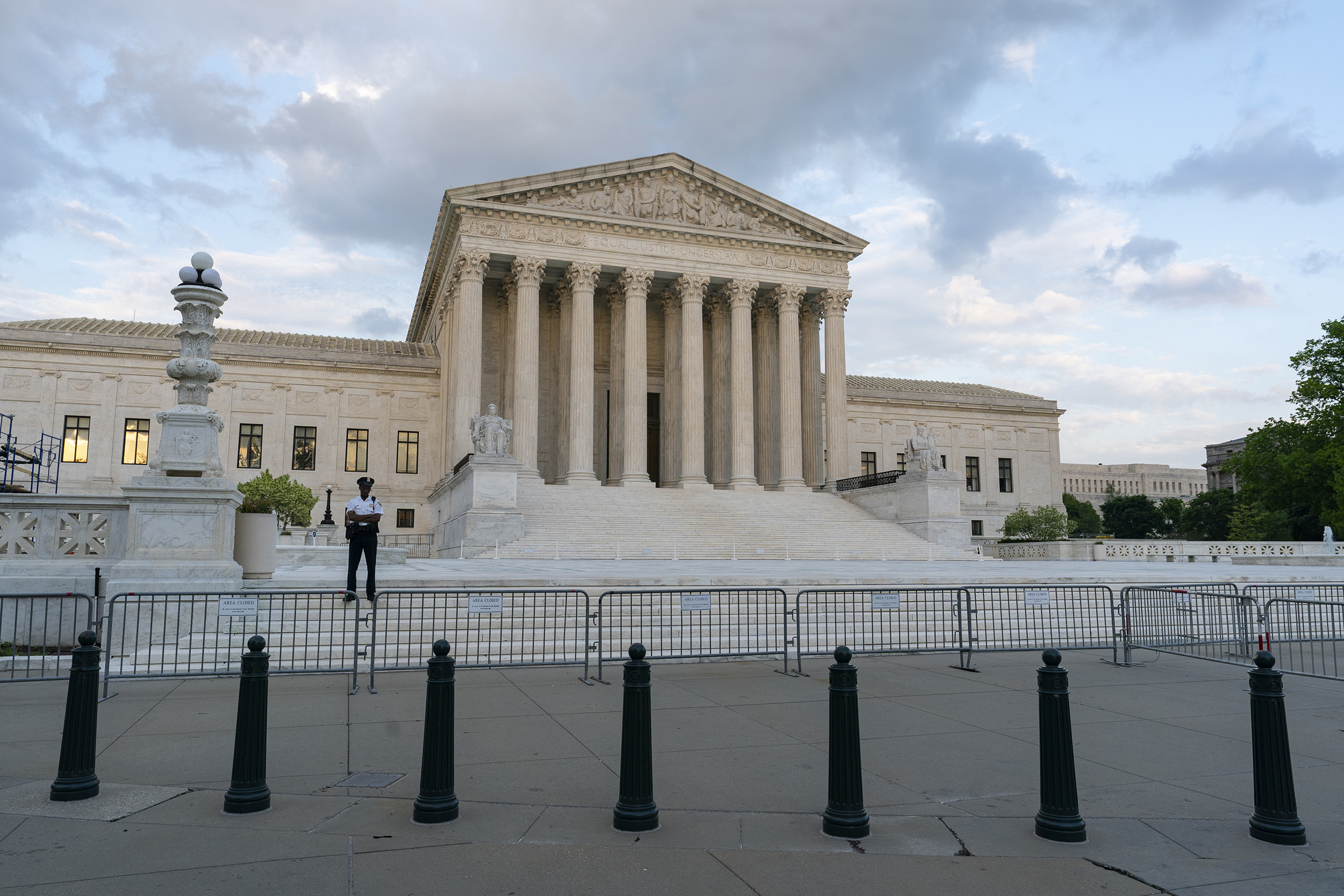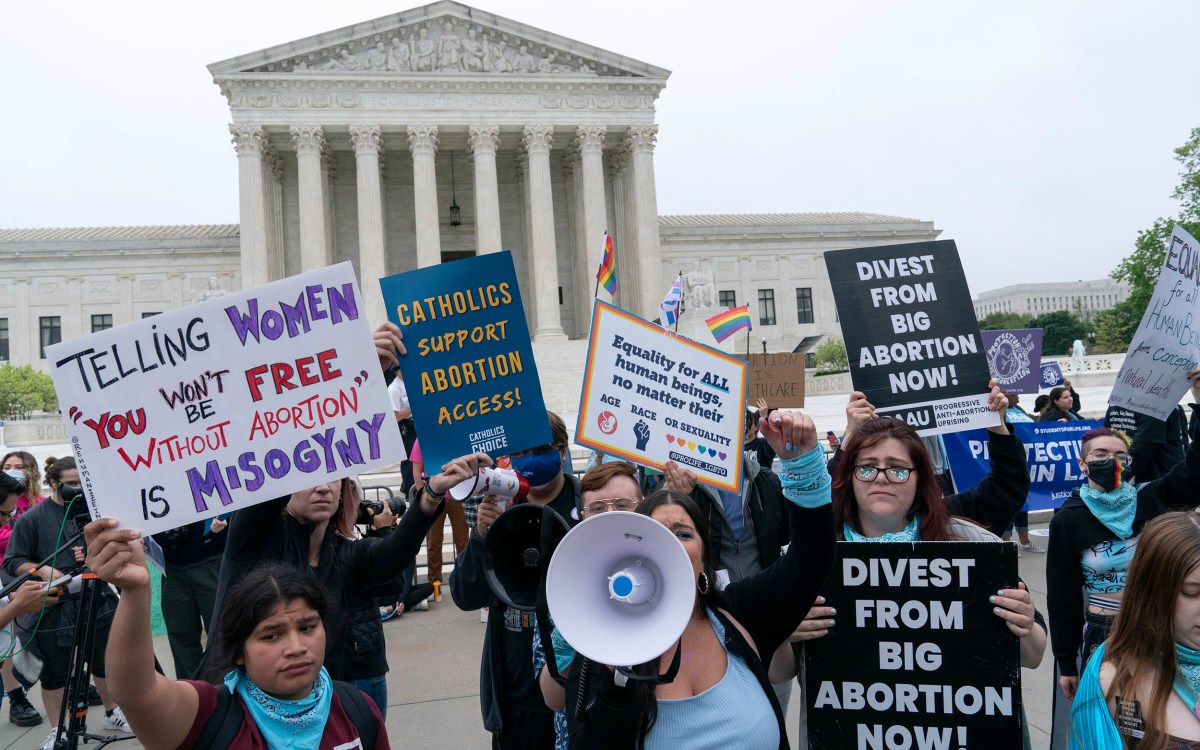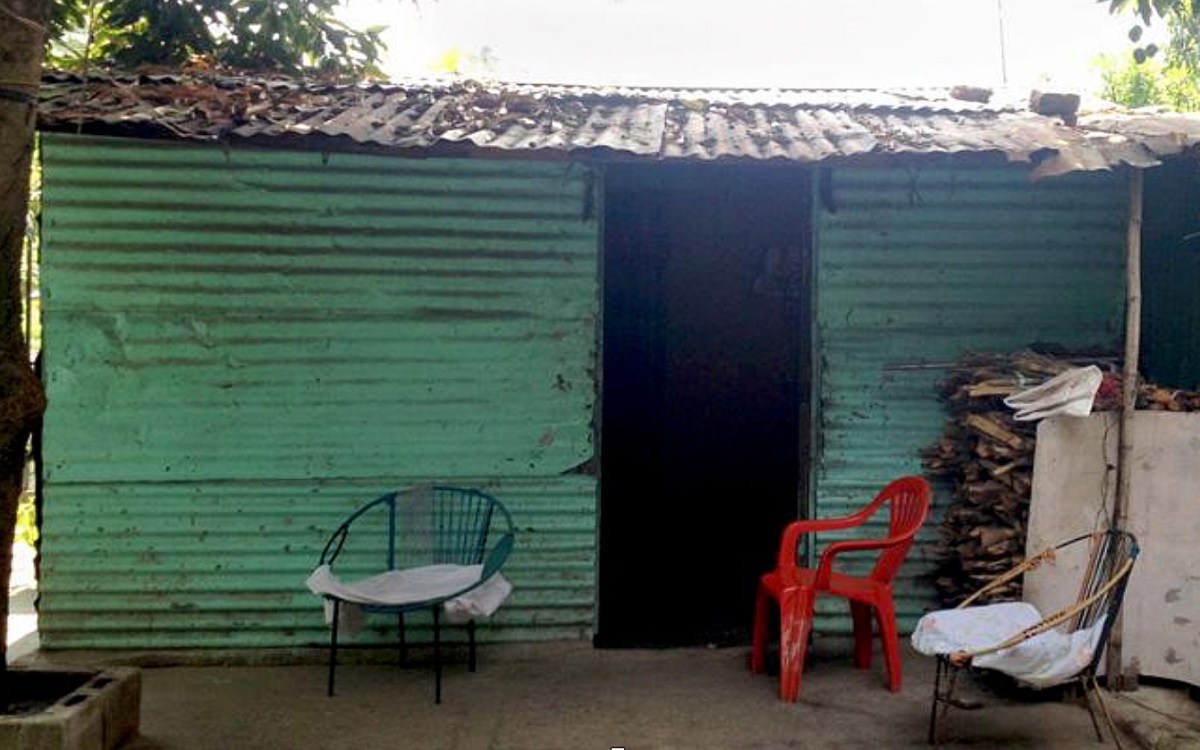
Following the leak of a draft decision by the Supreme Court that would overturn Roe v. Wade, the Medical School’s Louise King discusses how the potential ruling might affect providers.
AP Photo/Alex Brandon
How a bioethicist and doctor sees abortion
Her work touches questions we can answer and questions we can’t. But her main focus is elsewhere: ‘the patient in front of me.’
With the leak Monday of a draft decision by the Supreme Court that would overturn Roe v. Wade, the future of abortion in the U.S. has been a highly charged topic of conversation all week. Doctors are among those wondering what’s next. Louise King is an assistant professor of obstetrics, gynecology, and reproductive biology at Harvard Medical School and a Brigham and Women’s Hospital physician whose practice includes abortion services. King, who is also the director of reproductive bioethics for the Center for Bioethics at the Medical School, spoke with the Gazette about ethical dimensions of abortion and how a ruling against Roe might affect providers.
Q&A
Louise King
GAZETTE: In the U.S., abortion is framed in broad ethical terms: life versus death, privacy versus government intrusion, etc. From a medical ethics standpoint, what are the important concerns to be balanced on this issue?
KING: I frame the topic in the context of the patient in front of me. In other words, I look primarily to autonomy and beneficence in the context of doing good for the patient. That might mean upholding that person’s choice not to proceed with what is still a very dangerous proposition, namely carrying a pregnancy to term and delivering. If someone says to me, “I’m pregnant and do not wish to be pregnant,” for a multitude of reasons, I support that decision, because the alternative of carrying to term is risky. I want to protect that person’s bodily autonomy. From a reproductive justice standpoint, I want to support persons who have uteri in making decisions about when they wish to have a family, how they want that to look, whether they want to have a family at all, in expressing their sexuality, and in all kinds of different things.
I don’t believe that life begins at conception. Among the minority of people in this country who believe that’s the case, some are vocal and aggressive in imposing that belief on others, which may happen with this upcoming decision. But quite a number of students that I meet who believe life begins at conception still don’t believe that they have the right to impose that belief on others. To contextualize what we ask of persons with uteri when we make abortion illegal, it’s helpful to compare instances where we could ask people to undergo very risky procedures to help others. For example, we don’t demand that people give blood. It’s not a big deal and it could save lives every day, but we don’t demand that anybody donate blood or bone marrow. We don’t demand kidney donations, which are less risky than childbirth nowadays.
So we generally don’t ask one human being to give so completely of themselves to another, but we do so when it’s a pregnant person. That, I believe, does not comport with our ethics. But it also doesn’t fully address the concerns of persons who believe life begins at conception. They come to those beliefs honestly, but I think they have to explore them more deeply and figure out whether, even if true — do they hold up to the point where we require somebody to have a forced pregnancy to term? I would say, within my understanding of ethics, no.
“It’s not a big deal and it could save lives every day, but we don’t demand that anybody donate blood or bone marrow. We don’t demand kidney donations, which are less risky than childbirth nowadays.”
GAZETTE: Abortion is one of the most divisive issues in the country. Is the medical profession unified on it one way or another?
KING: That’s hard to say definitively. No study or survey exists to truly quantify this. The American Medical Association and the America College of Obstetricians and Gynecologists say that abortion is health care, and I agree. ACOG is very strong in their wording about supporting the right to access abortion. Unfortunately, only 14 percent of practicing OBGYNs provide abortion care. As a profession, our words and actions don’t match. I think there’s a multitude of reasons for that. One is the stigma associated with providing abortion care in some parts of the country.
I would guess that most providers feel similarly to the majority of Americans — that abortion is health care and should be available. While I’ve met some medical students and practicing physicians in all kinds of disciplines who feel strongly that abortion is unethical, the vast majority that I’ve spoken to feel as I feel: that it’s health care and should be provided.
GAZETTE: A big part of the debate over the decades has centered on viability. Is this an issue for science to determine? Is it an issue for society? Is it an issue for religion?
KING: I don’t think that science can tell us definitively when life begins. Life is a broad term and includes a variety of living entities. I don’t think that religion can define it because we have freedom of religion and religions see this differently. Rabbis will explain that in the Torah, it’s very clear that an embryo is simply an extension of a woman’s body, like a limb, and should not be considered another person until birth. The leaked decision presumes that one version of Christianity’s assessment of this prevails, which seems to violate our understanding of freedom of religion in this country.
Ultimately, “when life begins” isn’t the right question because it’s unanswerable. The question then must be: How do we as a society come up with a compromise that upholds the autonomous rights of the persons in front of us who may become pregnant, who may have excessive risks associated with a pregnancy, or who may simply not wish to be pregnant, that also observes whatever our society’s agreed-upon understanding is of when a protected entity exists.
I think Massachusetts absolutely gets it right. If you read the Roe Act: Abortion is allowed for any reason in the first and second trimesters, and then abortion for medical reasons or lethal fetal anomalies can extend into the third trimester with careful consideration between patient and medical teams. To me, that is an exceptionally well-thought-out compromise. This is a societal decision. It shouldn’t be made by a minority of persons based on their narrow definition of “when life begins.”
GAZETTE: If something like the leaked draft decision emerges, is there a potential for medical providers to get caught in the middle?
KING: Overturning Roe would turn the question over to the states. That would mean that those providers who exist within the states that are clearly going to go forward with legislation to outlaw abortion would be in dire situations. In Massachusetts, we could provide the care we’re already providing and would expect people to travel from out of state to us. I don’t think that the long-arm statutes would reach a provider here, that somebody could come after me from Texas if somebody traveled from Texas to me and I provided care. But if I traveled to Texas, for a conference, it might. Legal experts aren’t sure.
GAZETTE: Have you ever been threatened because you’ve offered abortions?
KING: I haven’t, but many of my colleagues have. I did my training in Texas, so I lived a long time in the South. I’ve not been threatened directly, but spoken sternly to by many people who disagreed with me. I mentioned earlier that there are plenty of people who believe life begins at conception but who do not feel they should impose their viewpoints on others — those are people I met in Texas and Louisiana. There are a lot of people like that, but they can’t speak up for fear of being ostracized. The sense that I have through all the conversations I’ve had over many years is that we are all talking past each other. You started off by saying this is a topic that divides our country, but it doesn’t. The vast majority of people are settled on having abortion as an option, having contraception as an option, and having sex education available. There’s a group of politicians who make it appear that we’re divided and build their political careers off of that. It’s incredibly disheartening and unethical for them to do so.







